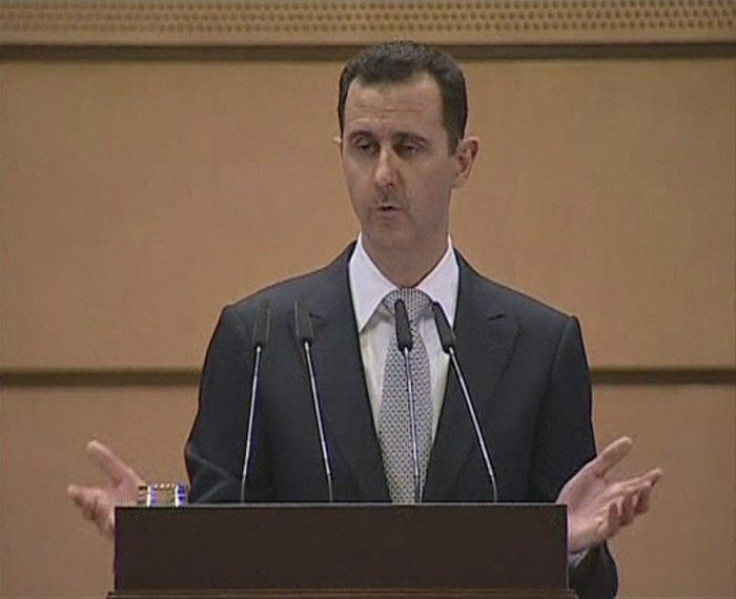We Will Be Haunted By Syria
Opinion

Life, the philosopher Soren Kierkegaard said, must be lived forward, but can only be understood backwards.
What's true of individuals is true of nations. As we, as a nation, look back in an effort to understand our history, we invariably question some of the decisions we made -- and the horror we tolerated.
Years from now, we will look back at the barbaric slaughter in Syria and wonder why we succumbed to the false hopes of diplomacy, the unconvincing arguments for inaction, the misplaced concerns about global stability, and the outsized fears of inciting more unrest in Syria and beyond.
Years from now, we will feel about Syria as we do, today, about Rwanda and Darfur. We will recall our promises of never again and our vows to speak up, take action, and prevent another horror -- and we'll wonder why we did not follow through.
We'll wonder, for instance, why we put our faith in diplomacy when faced with a desperate, determined and murderous strongman in Damascus.
Did we really think that United Nations envoy Kofi Annan would convince Bashar al-Assad to gracefully give up power, or that U.S. officials would convince Russian leader Vladimir Putin to turn his back on a longstanding ally and, in doing so, reduce Moscow's influence in a nearby and important region?
Years from now, will Annan, in meeting with al-Assad and raising hopes of a diplomatic solution, look much different than Chamberlain at Munich, offering his vacuous reassurances to a gullible world?
We'll wonder, as well, why we bought the backwards argument, propagated by Fareed Zakaria and others, that stronger U.S. intervention would compel invention from our adversaries, launching a proxy war between the United States on one side and Moscow and Iran on the other.
In fact, our adversaries intervened long ago, with Moscow providing the arms and Tehran providing the street thugs to prop up al-Assad. Washington's latest discovery that Moscow is providing attack helicopters so al-Assad can better slaughter his people from the air belies Moscow's claim that it's doing nothing to assist its Syrian ally.
It was our adversaries, not us, who launched a proxy war of sorts -- with Moscow and Beijing blocking global measures at the U.N. Security Council, Moscow and Tehran helping on the ground, and Moscow proposing a global confab to address the Syrian conflict that would bring Syria's closest ally, Iran, to the table.
The only question now is whether Washington will counter these efforts by, for instance, working with our allies to provide more resources to the opposition, establish safe havens to protect Syria's people and enable opposition forces to regroup, impose a no-fly zone, and even, if necessary, conduct air strikes on Syria's military.
We'll wonder, too, why we succumbed to the foreign policy realists' desire for global stability at all costs.
The stability that has kept al-Assad in power in Damascus and his closest ally, the Iranian regime, ensconced in Tehran has not served U.S. interests. Quite the contrary, it has set them back in multiple ways.
While Tehran remains the world's most aggressive state sponsor of terrorism, Damascus is a partner in crime, serving as a conduit for shuttling arms to terrorists who have killed U.S. troops in the region. Al-Assad supports Tehran's pursuit of nuclear weaponry and assists its push for larger regional influence.
Iran's leaders understand al-Assad's importance. That's why, in recent days, top Iranian military officials have threatened to mount a forceful resistance to any outside intervention that's designed to topple him.
Besides, appeals to regional stability will not make Syria more stable internally -- not with the opposition refusing to back down and, according to some U.N. officials, with the nation already descending into civil war.
Instead, appeals to stability that convince Washington and its allies not to intervene more forcefully in Syria give al-Assad free reign to continue his horrific slaughter, to terrorize his people, to use children as human shields, and to set fires that block the escape routes for would-be refugees.
To be sure, stronger U.S. action would bring its share of risks, both in the operation and aftermath of any U.S. effort. But, inaction raises prospects that al-Assad will survive indefinitely -- and that will guarantee more government-imposed slaughter, assist Tehran immeasurably, and set back U.S. interests.
Speaking at the Holocaust Museum in late April, President Barack Obama said, [T]oo often, the world has failed to prevent the killing of innocents on a massive scale. And we are haunted by the atrocities that we did not stop and the lives we did not save.
Years from now, we will again be haunted by the atrocities that we did not stop and the lives we did not save -- this time in Syria.
Lawrence J. Haas, former communications director for Vice President Al Gore, is senior fellow at the American Foreign Policy Council and author of Sound the Trumpet: The United States and Human Rights Promotion (out in June from Rowman & Littlefield).
© Copyright IBTimes 2024. All rights reserved.











